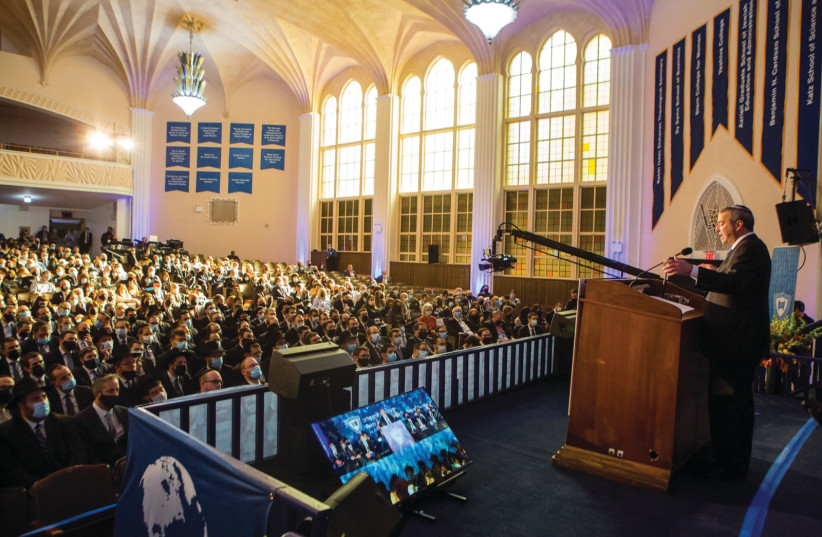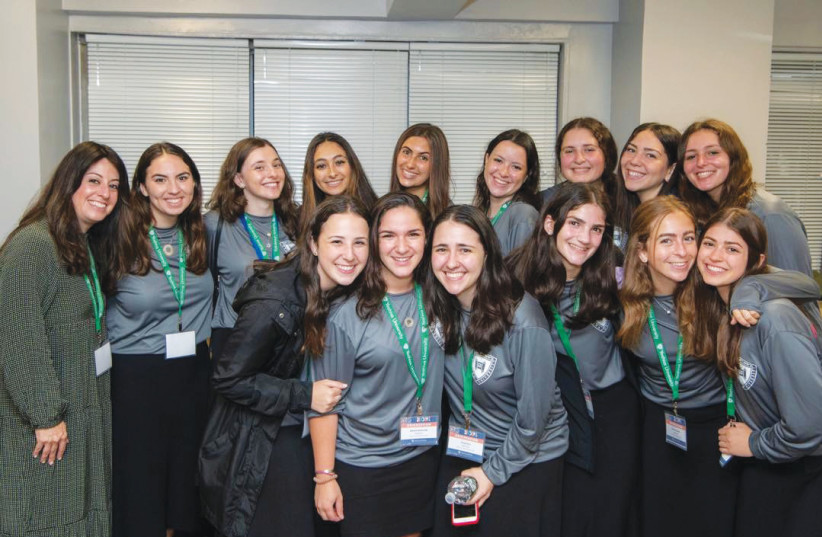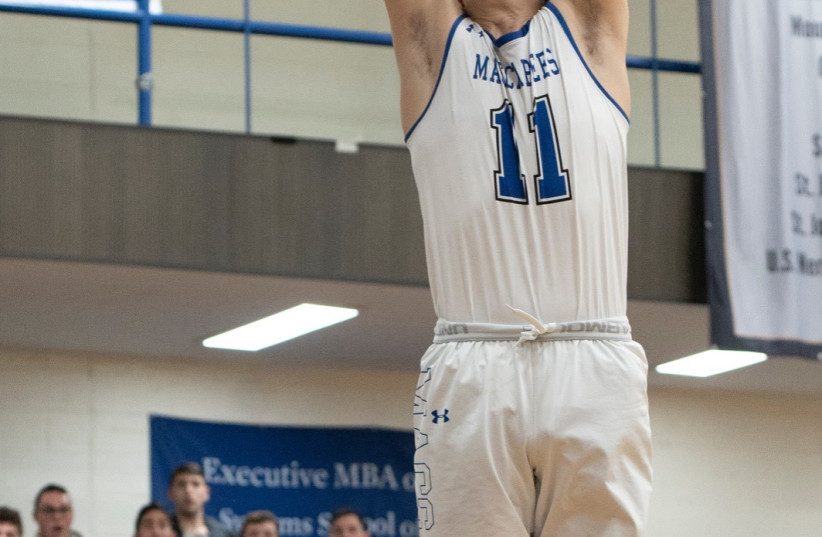“The issue of streams in Judaism isn’t relevant anymore,” Yeshiva University president Rabbi Dr. Ari Berman told me in an interview in a Jerusalem hotel lobby, days before Passover.
Berman informed me that the terms I’ve been using aren’t relevant to modern Jewish life in the Diaspora. “I don’t really do the whole streams thing. I think the world is shifting and there’s a much bigger way of thinking about American Judaism or the shifts in denominations.”
<br>OK, so what is this shift?
Meaning, we’re looking at the trends and things are shifting. We’re not stuck in the same kinds of denominationalism that you know, one has seen from the 19th century into the 20th century. The demographics are shifting and there’s a lot of room in the centrists camp to grow and it’s not the same denominations in the same narrow boxes in that socio way.
<br>In a way this sounds like a piece that my friend Liel Leibovitz wrote in Tablet Magazine, “Them and Us”; meaning that there is the pro-Israel, pro-tradition group in American Judaism and there is the progressive camp.

One hundred percent. I’m saying Liel Leibovitz is an amazing Israeli American. He’s an example: he was secular in Israel and now is religious in the United States. All of these categories don’t really describe the future. And we need to be preparing for a different way of defining Judaism.
“So in the upcoming years, I would be looking at the demographics of the next 20 to 30 to 40 years. It’s clear that, at the moment, Orthodoxy is growing. Forty years from now, the largest denomination in the US will be Orthodoxy. And that means we need to be thinking about that. We need to be thinking about the implications of that for our policies in terms of trying to bring in the next generation of children who don’t identify with Orthodoxy.
Berman noted, “I’ve been thinking about them in terms of the centrist’s camp to polish our jewels. Like how do we invest in those in our center group to be leaders, to bridge the Jewish people together?”
<br>What is this centrist group?
I think people who share our core values, like believing in truth, bringing out the truth and applying it to life. God being in your whole life; appreciating the individuality of the holiness of each individual, while at the same time being part of a larger community and seeing Israel as the redemption it is.
<br>What Berman isn’t saying is that there are groups that are already starting to integrate into Orthodoxy such as the Conservative movement that is slowly getting smaller, Israeli-Americans and others.
“Do you know what we need to focus on a little more?” Berman asked, “It’s the bridge builders.” He asked to implement the idea of bridge builders to the profession of journalism, in order for me to understand this a bit deeper, “It’s how you use your platform. You could focus on the important issues or you can focus on what separates us.”
He explained that COVID-19 actually was something that helped Yeshiva University grow and become larger than it was before the pandemic. “We now have full graduate degrees online. We’ve expanded our market base and are continuing to expand. The undergraduate degrees are in person, but some of our graduate degrees are online.
We have seven degrees now fully asynchronous: MBA, cybersecurity, education, social work and other subjects as well. What it does is it just gives us a much broader reach. Our social work schools grew from about 250 students before COVID-19 to 1,000 currently. So yes they’ve basically quadrupled. Many of our social work students are actually in Israel, but not only there. Some of them are actually on the West Coast and in other locations.”
Berman said that it’s not just that the Yeshiva University has expanded to Israel and other locations in the US, but it has also opened up to other groups. “We are now in broader communities. One of the things we found is that let’s say our more right-wing [ultra-Orthodox] brothers and sisters are now interested in a YU degree and we can supply that to them. We are in the haredi world now. And they’re interested in one issue: a university degree. This is what I was saying about a shift: people are coming together in the Jewish world.”
Beginning next year, Berman said that students in Israel – whether Israeli or American – will actually be able to study in person in the YU campus in Jerusalem toward a degree in many fields. He added that the Council for Higher Education in Israel looked into the issue of YU offering degrees in Israel online and realized that this isn’t a problem.
“It’s revolutionary. This is all online and it’ll be an American degree. You can now study Torah in Israel, get an American MBA, and because of our donors the tuition will only be 50%. I want Americans to come do these kinds of programs and be exposed to what’s going on in Israel and Israelis to be exposed to what’s going on in the Diaspora.”
Berman is probably the first president of YU who lived in Israel before he began his term. The fact that the leadership of this veteran modern Orthodox academic and Judaic institution decided to choose an American-Israeli to lead it may show yet another shift in what is going on there and in the Orthodox community in general.
He explained that part of his agenda for YU students is to strengthen their Jewish connection in many ways. “We started bringing interns to Israel for the summer last year with 10 students. This year, we tripled it with 30 students interning in Israel during the summer. We’re bringing more and more people to Israel. Another pilot program is establishing a semester abroad – in Israel – as part of our business school.”
<br>Who is Ari Berman?
Rabbi Dr. Ari Berman, 51, is the fifth president of the University. Growing up in Queens, New York, he graduated from the YU-affiliated Marsha Stern Talmudical Academy. He studied in Yeshivat Har Etzion in Alon Shevut, earned a BA from Yeshiva College, rabbinical ordination from the Rabbi Isaac Elchanan Theological Seminary and an MA in Medieval Jewish Philosophy from Bernard Revel Graduate School. He served as the lead rabbi at The Jewish Center of Manhattan. He moved to Israel, where he completed a PhD in Jewish thought from Hebrew University.
Before moving back to the US. he also served as head of the Heichal Shlomo Jewish Heritage Center in Jerusalem. Berman and his wife have five children, three of whom live in Israel, with the two younger ones in New York. He told me that “we made aliyah only 15 years ago and we moved to Neveh Daniel. We still have our house there and we’re there every time we come to Israel just like now for Passover.
“This is part of what I call the ‘YU Israel Superhighway,’” he shared. “It’s all about building connections and being the bridge builders.
“We just announced in December that we started a capital campaign for $613 million [a take-off on the 613 commandments or mitzvot in the Torah]. We’ve already raised over $250 million. People are giving to Yeshiva University because they believe in Yeshiva University.”

What do you think your students should or can learn from Israelis and what can or should Israelis learn from your students?
I actually think even broader if I can: I want to put our students in conversation with students in Israel. There’s a whole list of things to learn about; growing up in the Jewish state versus growing up in the Diaspora. And the challenges and opportunities in each of them. I think they’ll find fascinating the things they have in common.
We’re in a world of enormous opportunity now. Standing for tradition and being able to bring it into the world is interesting to people. It’s a voice that they want to hear. And what we found in this world is that there’s a number of opportunities that the Jewish people didn’t necessarily have before. These include being the Jewish voice in the global moral conversation.
<br>What’s the difference between an Israeli teenager who goes to a yeshiva high school to an American Jewish teenager who goes to a yeshiva high school?
There’s a lot more pressure on kids to be successful and academic in the US. Growing up in religious Zionist yeshiva in Israel, you’re much more deeply knowledgeable on Jewish texts. You speak the language so it’s so much easier. And it’s deep like you really have a grand exposure. Your life growing up in a Jewish country is also something substantial. You can’t quantify what that means to your sense of self-identity and confidence. It’s just natural, it’s organic. And on the US side, I think it is true that you have a larger range of experiences that are broadening and challenges such as materialism.
It’s a double-edged sword, as you said, on the one hand, there’s drive, which I think is a great drive for excellence. On the other hand, where you’re channeling that - and American communities often channel that - to being upper middle class and it sometimes becomes too much of a goal. You know, there’s a cost of living difference.

One thing that I find interesting in the US nowadays is that many Orthodox Jews wear their kippah to work – something that wasn’t popular in the past.
One hundred percent. This is a real difference in the confidence of Orthodox Jews. And what I’m suggesting is a difference in our goals. Our goal isn’t just to make a living and come back to our Jewish community, our goal is to represent: When we work, we’re not hiding who we are. This is the sort of thing I was saying at The Jerusalem Post conference in London: We need Jews that fight to combat anti-Semitism and be at the forefront of defending us for our survival. Yet, we also need Jews that will be out in the world that will inspire and represent us as proud Jews.
Berman said that this is exactly why he thinks that the fact that the YU Macs basketball team winning streak this year was a success “they wear kippot on their heads and sing ‘Hatikva’ during every game in addition to ‘The Star Spangled Banner.’” We had tens of thousands of people watching them. It was all over the country. It was unbelievable.
“I’ve spoken to NBA players. They all ask me about our star Ryan Turell. The whole country was talking about the Jews winning in basketball, how they’re winning and the character that when they play, they’re not just playing for themselves. You don’t just play for a school, you play for people.”
Berman noted that YU is one of the top 70 universities in the US. “We just moved up 29 places in US News and World Report university rankings. We went from 97 to 68. So we’re a top school in the country. There’s over 1,000 schools on the list. So, it’s unbelievable that the Jewish university is an elite, academic institution. I mean, it’s like, so mind-boggling.
“We improved the academics, we created all these graduate platforms. We have 20 new graduate degrees. So we’ve really shifted the whole educational model. Now, I want to write about, teach and work with YU students; to talk about the Torah values that we stand for, as a community.”
<br>What would you like to achieve in the upcoming years as president? What would you like to look back on and say, Wow, this is what I’ve achieved?
“Our framework is being the flagship Jewish university. That’s our framework. So the flagship Jewish university needs to be rooted in Torah values, versus needing to be excellent. And we’re looking to move up from being the number 68 university in the country to being in the top 50. We need to continue our excellence, and we need to be educating leaders of tomorrow and thinking globally. I want Israel to develop, I want to create more platforms. We’re able to root them in Torah values. They know who they are.
“Excellence in education is the key and molding them as leaders with a real vision about what they could impact, accomplish and be fulfilled.”
